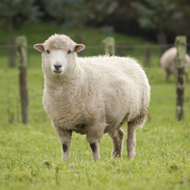BTV-8: Farmers urged to vaccinate before it's too late

If bluetongue were to arrive in Britain the greatest impact on sheep and cattle farmers would be restriction zones of at least 150km.
Sheep and cattle farmers are being urged to vaccinate their stock against bluetongue virus 8 (BTV-8) before it's too late.
Defra's most recent situation assessment predicted a high risk of infected midges arriving in Britain from across the channel by the end of summer.
The latest update reports there has been a total of 288 outbreaks of BTV-8 in France.
Vaccines for sheep and cattle in Britain are now available from Zoetis and MSD Animal Health.
Gareth Hateley, senior vice president of the British Cattle Veterinary Association (BCVA), urged farmers to discuss the disease risk situation with their vet as soon as possible.
If bluetongue were to arrive in Britain, he says the greatest impact on sheep and cattle farmers would be restriction zones of at least 150km, which would prevent susceptible animals moving to other parts of the country.
"This would have significant implications for trade and animal welfare, so far better to take all available steps to try and prevent disease, rather than have to deal with an outbreak once it occurs."
While vaccination has been shown to control bluetongue, the success of a vaccination programme depends on a high proportion of cattle and sheep receiving the inoculation, particularly in southern England.
"Widespread vaccination helped to prevent bluetongue gaining a foothold in Britain the last time the disease threatened our shores back in 2007/08," said MSD Animal Health technical manager John Atkinson.
"Experience of that outbreak in Northern Europe tells us though that if the virus is not effectively controlled within a naïve livestock population we are likely to see a dramatic increase in cases over successive seasons, with hundreds in the first season, thousands in the next and tens of thousands in year three. It’s just not worth the risk of not vaccinating."



 The latest
The latest